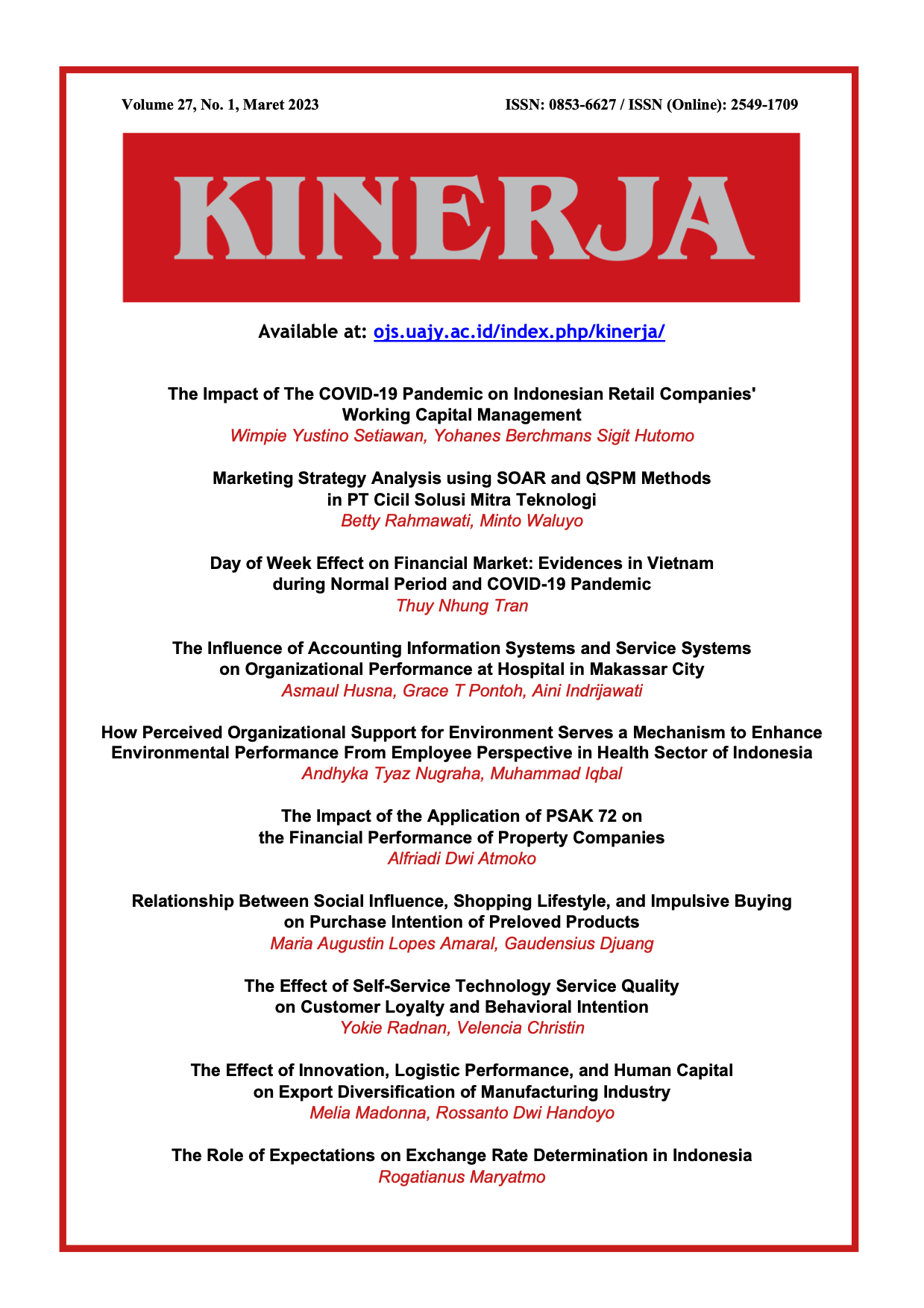How Perceived Organizational Support for Environment Serves a Mechanism to Enhance Environmental Performance From Employee Perspective in Health Sector of Indonesia
DOI:
https://doi.org/10.24002/kinerja.v27i1.6341Keywords:
organizational support, environmental performance, green HRMAbstract
Our study investigates the role of Green human resource management (GHRM) practices on the individual environmental performance of employees (IEP) as well as the mediating role of perceived organizational support (POS) in the health sector in Indonesia. Data was collected using a questionnaire that was shared with 310 nurses working in Indonesian as respondents. SmartPLS 3 software is used to analyze data by adopting the PLS-SEM approach. The research findings reveal a strong and positive relationship between the dimensions of GHRM practices such as Green Employee Involvement (GEI), Green Management Performance (GMP), and Green Training (GT) on the individual environmental performance of employees in Indonesia's health sector. Furthermore, we also found an indirect effect of GHRM practices on employees' environmental performance through perceived environmental support from the organization company. Based on our study, we suggest Institutions and organizations in Indonesia's health sector concern implement GHRM practices to improve their employees' individual environmental performance. Specifically, our study extends the previous literature by exploring the relationship of GHRM practices with individual environmental performance using perceived organizational support (POS) as a mediating variable.
References
Al Mehrzi, N. and Singh, S. K., 2016. Competing through employee engagement: a proposed framework. International Journal of Productivity and Performance Management. Edited by S. Kumar Singh, Thomas F. Burgess and John Heap, 65(6), pp. 831–843. doi: 10.1108/IJPPM-02-2016-0037.
Amrutha, V.N. and Geetha, S.N. (2020) ‘A systematic review on green human resource management: Implications for social sustainability’, Journal of Cleaner Production, 247, p. 119131. Available at: https://doi.org/10.1016/j.jclepro.2019.119131.
Bakari, H. et al. (2019) ‘Moderating role of cynicism about organizational change between authentic leadership and commitment to change in Pakistani public sector hospitals’, Leadership in Health Services, 32(3), pp. 387–404. Available at: https://doi.org/10.1108/LHS-01-2018-0006.
Bjärntoft, S. et al. (2020) ‘Occupational and Individual Determinants of Work-life Balance among Office Workers with Flexible Work Arrangements’, International Journal of Environmental Research and Public Health, 17(4), p. 1418. Available at: https://doi.org/10.3390/ijerph17041418.
Blau, P.M. (1964) ‘Justice in Social Exchange’, Sociological Inquiry, 34(2), pp. 193–206. Available at: https://doi.org/10.1111/j.1475-682X.1964.tb00583.x.
Boiral, O. and Paillé, P. (2012) ‘Organizational Citizenship Behaviour for the Environment: Measurement and Validation’, Journal of Business Ethics, 109(4), pp. 431–445. Available at: https://doi.org/10.1007/s10551-011-1138-9.
Bos-Nehles, A.C. and Veenendaal, A.A.R. (2019) ‘Perceptions of HR practices and innovative work behavior: the moderating effect of an innovative climate’, The International Journal of Human Resource Management, 30(18), pp. 2661–2683. Available at: https://doi.org/10.1080/09585192.2017.1380680.
Bradley, D.B. (2014) ‘Do Companies Understand What Employees Want from their Social Exngagement Experience?’, Procedia - Social and Behavioral Sciences, 109, pp. 531–535. Available at: https://doi.org/10.1016/j.sbspro.2013.12.502.
Chaudhary, R. (2020) ‘Green Human Resource Management and Employee Green Behavior: An Empirical Analysis’, Corporate Social Responsibility and Environmental Management, 27(2), pp. 630–641. Available at: https://doi.org/10.1002/csr.1827.
Chen, L. et al. (2004) ‘Human resources for health: overcoming the crisis’, The Lancet, 364(9449), pp. 1984–1990. Available at: https://doi.org/10.1016/S0140-6736(04)17482-5.
Daily, B.F., Bishop, J.W. and Govindarajulu, N. (2009) ‘A Conceptual Model for Organizational Citizenship Behavior Directed Toward the Environment’, Business & Society, 48(2), pp. 243–256. Available at: https://doi.org/10.1177/0007650308315439.
Danish, R.Q., Ramzan, S. and Ahmad, F. (2013) ‘Effect of Perceived Organizational Support and Work Environment on Organizational Commitment; Mediating Role of Self-Monitoring’, Advances in Economics and Business, 1(4), pp. 312–317. Available at: https://doi.org/10.13189/aeb.2013.010402.
Davis, M.C. et al. (2020) ‘Can green behaviors really be increased for all employees? Trade-offs for “deep greens” in a goal-oriented green human resource management intervention’, Business Strategy and the Environment [Preprint]. Available at: https://doi.org/10.1002/bse.2367.
Diamantidis, A.D. and Chatzoglou, P. (2019) ‘Factors affecting employee performance: an empirical approach’, International Journal of Productivity and Performance Management, 68(1), pp. 171–193. Available at: https://doi.org/10.1108/IJPPM-01-2018-0012.
Eizenberg, E. and Jabareen, Y. (2017) ‘Social Sustainability: A New Conceptual Framework’, Sustainability, 9(1), p. 68. Available at: https://doi.org/10.3390/su9010068.
Fernandez, S. and Moldogaziev, T. (2013) ‘Using Employee Empowerment to Encourage Innovative Behavior in the Public Sector’, Journal of Public Administration Research and Theory, 23(1), pp. 155–187. Available at: https://doi.org/10.1093/jopart/mus008.
Fernando, Y., Chiappetta Jabbour, C.J. and Wah, W.-X. (2019) ‘Pursuing green growth in technology firms through the connections between environmental innovation and sustainable business performance: Does service capability matter?’, Resources, Conservation and Recycling, 141, pp. 8–20. Available at: https://doi.org/10.1016/j.resconrec.2018.09.031.
Glavas, A. and Kelley, K. (2014) ‘The Effects of Perceived Corporate Social Responsibility on Employee Attitudes’, Business Ethics Quarterly, 24(2), pp. 165–202. Available at: https://doi.org/10.5840/beq20143206.
Gond, J.-P. et al. (2010) Corporate social responsibility influence on employees, Research Paper Serie International Centre for Corporate Social Responsibility.
Guerci, M. and Carollo, L. (2016) ‘A paradox view on green human resource management: insights from the Italian context’, The International Journal of Human Resource Management, 27(2), pp. 212–238. Available at: https://doi.org/10.1080/09585192.2015.1033641.
Gupta, N. (2019) ‘Research to support evidence-informed decisions on optimizing gender equity in health workforce policy and planning’, Human Resources for Health, 17(1), p. 46. Available at: https://doi.org/10.1186/s12960-019-0380-6.
Hair, J.F. et al. (2017) A Primer on Partial Least Squares Structure Equation Modelling (PLS). 2nd edn. California, USA: Sage Publications Ltd.
Hakimah, Y. et al. (2019) ‘Role budget participation and budget slack on supply chain operational performance: Evidence from indonesian textile industry’, International Journal of Supply Chain Management, 8(3), pp. 10–22.
Hameed, Z. et al. (2020) ‘Do green HRM practices influence employees’ environmental performance?’, International Journal of Manpower, 41(7), pp. 1061–1079. Available at: https://doi.org/10.1108/IJM-08-2019-0407.
Hongdao, Q. et al. (2019) ‘Does What Goes Around Really Comes Around? The Mediating Effect of CSR on the Relationship between Transformational Leadership and Employee’s Job Performance in Law Firms’, Sustainability, 11(12), p. 3366. Available at: https://doi.org/10.3390/su11123366.
Kirchoff, J.F., Omar, A. and Fugate, B.S. (2016) ‘A Behavioral Theory of Sustainable Supply Chain Management Decision Making in Non-exemplar Firms’, Journal of Supply Chain Management, 52(1), pp. 41–65. Available at: https://doi.org/10.1111/jscm.12098.
Korschun, D., Bhattacharya, C. and Swain, S.D. (2016) ‘CSR and the Frontline Context: How Social Programs Improve Customer Service’, GfK Marketing Intelligence Review, 8(1), pp. 24–29. Available at: https://doi.org/10.1515/gfkmir-2016-0004.
Kurapatskie, B. and Darnall, N. (2013) ‘Which Corporate Sustainability Activities are Associated with Greater Financial Payoffs?’, Business Strategy and the Environment, 22(1), pp. 49–61. Available at: https://doi.org/10.1002/bse.1735.
Lamm, E., Tosti-Kharas, J. and King, C.E. (2015) ‘Empowering Employee Sustainability: Perceived Organizational Support Toward the Environment’, Journal of Business Ethics, 128(1), pp. 207–220. Available at: https://doi.org/10.1007/s10551-014-2093-z.
Lindell, M.K. and Whitney, D.J. (2001) ‘Accounting for common method variance in cross-sectional research designs.’, Journal of Applied Psychology, 86(1), pp. 114–121. Available at: https://doi.org/10.1037/0021-9010.86.1.114.
Al Mehrzi, N. and Singh, S.K. (2016) ‘Competing through employee engagement: a proposed framework’, International Journal of Productivity and Performance Management. Edited by S. Kumar Singh, Thomas F. Burgess and John Heap, 65(6), pp. 831–843. Available at: https://doi.org/10.1108/IJPPM-02-2016-0037.
Nawaz, W., Linke, P. and Koҫ, M. (2019) ‘Safety and sustainability nexus: A review and appraisal’, Journal of Cleaner Production, 216, pp. 74–87. Available at: https://doi.org/10.1016/j.jclepro.2019.01.167.
Ones, D.S. et al. (2015) ‘Pro-Environmental Behavior’, in International Encyclopedia of the Social & Behavioral Sciences. Elsevier, pp. 82–88. Available at: https://doi.org/10.1016/B978-0-08-097086-8.22008-4.
Paillé, P., Valéau, P. and Renwick, D.W. (2020) ‘Leveraging green human resource practices to achieve environmental sustainability’, Journal of Cleaner Production, 260, p. 121137. Available at: https://doi.org/10.1016/j.jclepro.2020.121137.
Pearce, C.L. and Wegge, J. (2015) ‘Where Do We Go From Here? Is Responsibility Sustainable?’, Organizational Dynamics, 44(2), pp. 156–160. Available at: https://doi.org/10.1016/j.orgdyn.2015.02.010.
Pichler, S. et al. (2016) ‘Leader-Member Exchange, Group- and Individual-Level Procedural Justice and Reactions to Performance Appraisals’, Human Resource Management, 55(5), pp. 871–883. Available at: https://doi.org/10.1002/hrm.21724.
Podsakoff, P.M. et al. (2003) ‘Common method biases in behavioral research: A critical review of the literature and recommended remedies.’, Journal of Applied Psychology, 88(5), pp. 879–903. Available at: https://doi.org/10.1037/0021-9010.88.5.879.
Presiden Republik Indonesia (2012) ‘Peraturan Presiden Republik Indonesia Nomor 72 Tahun 2012 tentang Sistem Kesehatan Nasional’.
Ramus, C.A. and Killmer, A.B.C. (2007) ‘Corporate greening through prosocial extrarole behaviours – a conceptual framework for employee motivation’, Business Strategy and the Environment, 16(8), pp. 554–570. Available at: https://doi.org/10.1002/bse.504.
Raub, S. (2017) ‘When Employees Walk The Company Talk: The Importance Of Employee Involvement In Corporate Philanthropy’, Human Resource Management, 56(5), pp. 837–850. Available at: https://doi.org/10.1002/hrm.21806.
Rawashdeh, A.M. (2018) ‘The impact of green human resource management on organizational environmental performance in Jordanian health service organizations’, Management Science Letters, 8(10), pp. 1049–1058. Available at: https://doi.org/10.5267/j.msl.2018.7.006.
Renwick, D.W.S., Redman, T. and Maguire, S. (2013) ‘Green Human Resource Management: A Review and Research Agenda’, International Journal of Management Reviews, 15(1), pp. 1–14. Available at: https://doi.org/10.1111/j.1468-2370.2011.00328.x.
Susanti, S. et al. (2020) ‘Financial Sector Development of ASEAN Countries and Its Impact on CO2 Emission: A Panel Data Analysis of Various Banking Aspects’, Journal of Security and Sustainability Issues, 10(Oct), pp. 303–313. Available at: https://doi.org/10.9770/jssi.2020.10.Oct(23).
Tang, G. et al. (2018) ‘Green human resource management practices: scale development and validity’, Asia Pacific Journal of Human Resources, 56(1), pp. 31–55. Available at: https://doi.org/10.1111/1744-7941.12147.
Tian, Q. and Robertson, J.L. (2019) ‘How and When Does Perceived CSR Affect Employees’ Engagement in Voluntary Pro-environmental Behavior?’, Journal of Business Ethics, 155(2), pp. 399–412. Available at: https://doi.org/10.1007/s10551-017-3497-3.
Tomšič, N., Bojnec, Š. and Simčič, B. (2015) ‘Corporate sustainability and economic performance in small and medium sized enterprises’, Journal of Cleaner Production, 108, pp. 603–612. Available at: https://doi.org/10.1016/j.jclepro.2015.08.106.
De Young, R. (2000) ‘New Ways to Promote Proenvironmental Behavior: Expanding and Evaluating Motives for Environmentally Responsible Behavior’, Journal of Social Issues, 56(3), pp. 509–526. Available at: https://doi.org/10.1111/0022-4537.00181.
Zhang, Y. et al. (2019) ‘How Green Human Resource Management Can Promote Green Employee Behavior in China: A Technology Acceptance Model Perspective’, Sustainability, 11(19), p. 5408. Available at: https://doi.org/10.3390/su11195408.
Žmuk, B. (2017) ‘Are Publicly Available Online Businesses Lists Appropriate to be used as Sampling Frames in Croatian Business Surveys?’, Business Systems Research Journal, 8(2), pp. 26–39. Available at: https://doi.org/10.1515/bsrj-2017-0014.















